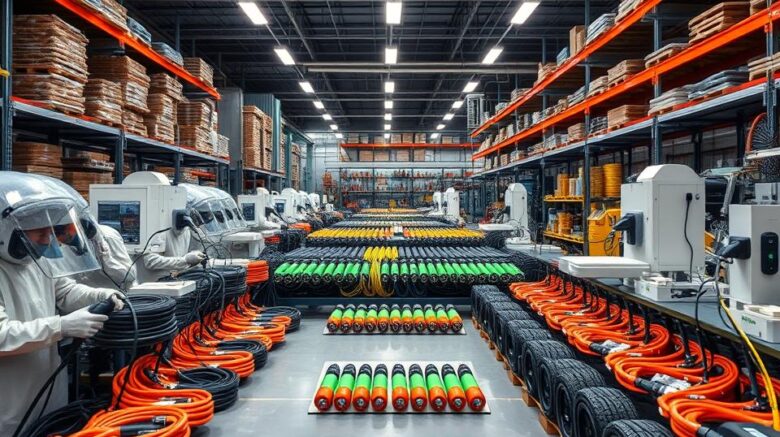Renowned EV Charging Cable Manufacturers for Your EV
The EV market is expanding rapidly, with the demand for reliable and fast charging solutions surging. As of now, leading companies have been at the forefront of this change, providing premium charging infrastructure. Southwire, for instance, entered the market in 2014 and excels, garnering 1000+ five-star reviews and a 75-year legacy in electrical construction.
The rise in electric vehicle adoption drives demand for robust, fast, and secure Charger Manufacturers in China. Key suppliers are developing to address changing requirements, offering products that enhance the overall charging experience.
Knowing the variations between various charging solutions is crucial for selecting wisely. High-grade charging infrastructure directly impacts vehicle performance and customer satisfaction.
Core Lessons
- Leading brands provide premium cables that boost durability and security.
- Growing EV adoption fuels demand for fast, reliable infrastructure.
- Leading companies innovate to meet the evolving needs of electric vehicle owners.
- Premium cables enhance both charge rate and vehicle function.
- Opting for top-tier cables yields future savings.

The Critical Role of Premium EV Charging Cables
As more drivers choose EVs, the significance of top-grade EV charging cables is immense. The performance, safety, and dependability of electric vehicle charging systems depend heavily on the quality of the charging cables used.
How EV Charging Tech Has Advanced
Electric vehicle charging technology has undergone significant advancements in recent years, with a focus on speedy charge times and enhanced protections. Today’s EV charging cables are designed to meet these evolving needs, incorporating high-grade materials and advanced designs to minimize power loss and maximize charging efficiency.
Quality’s Impact on EV Charging
High-grade cables ensure reliable, safe charging. Robustness, such as weather resistance and flexibility in extreme temperatures, ensure reliable operation across various environments. Additionally, regulatory compliance and adherence to industry guidelines are crucial in guaranteeing safe operation.
| Key Features | Benefits |
|---|---|
| Superior materials and construction | Minimized power loss during energy transfer |
| Enhanced durability features | Weather resistance, flexibility in extreme temperatures |
| Standards adherence | Rigorous safety requirements met |
| Maintainability | Long-term value proposition, reduced waste |
Products from Aichie Tech Electronics pass The Cable Lab’s stringent tests. Choosing maintainable Portable EV Charger, repairable designs reduce lifetime costs, reducing waste and protecting the planet.
Top EV Charging Cable Manufacturers in China
China is home to a growing number of EV charging cable manufacturers. They play a key role in global EV infrastructure, providing high-quality automotive cables designed for various charging needs.
Wottz – Top EV Cable Maker from 2014
Wottz has been a leading cable manufacturer since 2014. They offer a range of cables that cover Mode 1–4 charging standards, from Mode 1, 2, 3, and DC Fast Charging (Mode 4).
Aichie Tech Electronics: 75+ Years of Electrical Expertise
Aichie Tech Electronics leverages 75 years of electrical expertise in its EV cables. Their products are designed to meet the demands of both domestic and commercial EV charging infrastructure.
Additional Key Cable Suppliers
Companies developing flexible, weather-resistant and high-performance cables are also notable. These include Type 1 & 2 connector experts, as well as brands innovating in cable durability and adaptability.
Understanding Different Types of EV Charging Cables
As electric vehicles become increasingly popular, understanding the various types of EV Charging Cable Manufacturers is crucial for optimal charging experiences. Knowing cable types ensures you pick the right charger. The variety in EV charging infrastructure demands a closer look at the different cable types available.
Type1 vs. Type2 Charging Cables
Type1 and Type2 charging cables are two common standards used for EV charging. Type 1, also known as SAE J1772, is North American standard, while Type 2, or Mennekes, is the standard in Europe. The right cable matches your car and charger. Type 2 cables often support higher charging capacities, making them ideal for speed.
Level 2 & Fast DC Cables
Level 2 AC cables charge faster, up to 19.2 kW. DC Fast Charging cables, on the other hand, enable quick top-ups by on-site AC→DC conversion, delivering rapid fill-ups. These cables are essential for long-distance EV travel, enabling drivers to recharge quickly.
Portable vs Fixed Cables
Granny chargers plug into home outlets for emergency use. Tethered cables are attached permanently, offering ease at the cost of portability. The choice depends on the owner’s charging needs and preferences.
Cable length, power rating, and connector type matter most. For instance, portable charging cables range from basic Level1 emergency chargers to more robust Level2 solutions. Vehicle-to-load (V2L) cables let EVs act as mobile power banks.
- Portable charging cables offer flexibility, with options ranging from basic to more robust Level2 solutions.
- Tethered cables are permanently attached to charging stations, limiting flexibility but eliminating the need for personal cables.
- Cable length is a critical consideration, with options ranging from 5-meter standard cables to 50-meter extended cables.
Essential EV Cable Characteristics
Premium cables stand out for durability, safety, and performance. These features are crucial for maintaining the integrity of the charging process and safeguarding the vehicle and user.
Robustness and Weatherproofing
Cables must withstand rain, sun, and cold. Manufacturers like Wottz and Southwire use RoHS-compliant recyclable compounds, ensuring they perform in harsh climates. Their serviceable design facilitates easy maintenance and promotes recycling.
Maneuverability and Convenience
Flexibility and ease of use are also critical factors. High-quality EV charging cables are designed to be flexible, making them easier to handle and maneuver. This flexibility does not compromise their durability, as they are built to withstand regular use.
Regulatory Approvals
Approved safety marks ensure reliable performance. They ensure their products meet or exceed standards such as IEC62196 for connectors and UL2594 in North America. Rigorous third-party testing evaluates electrical safety, mechanical durability, and environmental resistance.
| Certification | Description | Region |
|---|---|---|
| IEC62196 | Connector safety standards | International |
| UL2594 | Standard for electric vehicle supply equipment | North America |
| ROHS | Restriction of hazardous substances | International |
By focusing on these key features, manufacturers can provide EV charging cables that not only meet the highest quality and safety standards but also enhance the overall user experience.
Cutting-Edge EV Cable Innovations
The latest developments in EV charging cable technology are revolutionizing the way we charge our vehicles, with a focus on speed, improved signal integrity, and sustainable compounds.
Thermal-Managed Fast Charging
Liquid-cooled charging cables are emerging as a key technology for ultra-fast charging, enabling electric vehicles to charge at significantly higher speeds without overheating.
Advanced Connector Tech
Hyperboloid contacts are being integrated into EV charging cables to enhance signal integrity, ensuring reliable and efficient data transfer during the charging process.
Sustainable and Recyclable Materials
Leading manufacturers are prioritizing sustainability in their cable designs, using recyclable materials and eco-friendly compounds that reduce environmental impact. For instance, companies like Aichie Tech Electronics and Wottz are adopting serviceable design philosophies and RoHS compliance to minimize waste and promote recycling.
Programs for cable recycling, non-toxic compounds, and TPU sheaths mark the eco shift.
Buyer’s Guide to EV Charging Cables
Choosing the right EV charging cable is crucial for efficient and safe charging. To make an informed decision, consider several key factors.
Compatibility with Your Electric Vehicle Model
Ensure the charging cable is compatible with your vehicle’s connector type. Your vehicle’s onboard charger capacity sets the upper limit for AC power.
Length Considerations
Choose a cable length that suits your charging needs. A longer cable adds reach at the cost of extra weight.
Matching Power and Speed
Ensure cable amperage aligns with charger and car. Standard Level 2 home charging operates at 7.2 kW, but some vehicles support up to 19.2 kW with appropriate electrical service.
Mind these points to pick a cable that fits your EV lifestyle.
Why Choose Premium Charging Solutions
With EV growth unabated, premium cables are essential. Choosing cables from Wottz or Aichie Tech Electronics provides long-term value and reliability. Their serviceable designs allow for component replacement, reducing waste and costs. This approach aligns with the core values of electric vehicle ownership by promoting sustainability.
Selecting top-grade infrastructure prepares you for next-gen charging.
